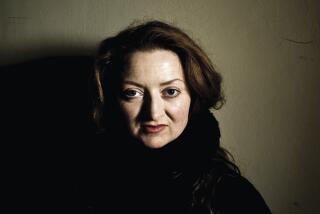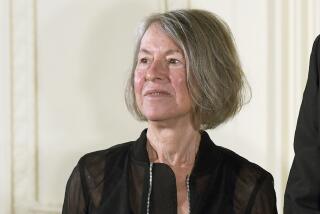Paul Zweig, as a Dark Poet, Views His Onrushing Demise
- Share via
Eternity’s Woods by Paul Zweig; postscript by Galway Kinnell (Wesleyan University: $15.95, hardcover; $7.95, paperback)
As Galway Kinnell notes in his postscript to “Eternity’s Woods,” Paul Zweig was a swift and articulate writer of prose; but “his poetry, which he wanted to write most of all, came with great difficulty.” Zweig was a professor and literary critic, professions apt to tether poetry to virtues other than those he sought. More important than the fetter of academic reticence was a kind of pudeur , for intimacy is like a secret, no longer itself when the cloak is rent, hard to expose without self-consciousness. But poetic sureness and quickness deepened in him as, in his 49th year, his own end approached.
Zweig’s is a poetry of the self, Whitmanesque, though in the instance darker, for the overriding theme of this collection is death--of love, marriage, family, and, finally, of self: “Lately I don’t sleep much./ It’s not anxiety, but a curious feeling/ That I must pay attention, or death will gain on me.” He did his part, but death did too.
No Time for Self-Consciousness
Given the failure of time, he clung to the continuity of place, particularly the Dordogne (“All my running has ended here.”), where he lived part of each year and where he went to ask: “How much must fall away before I have nothing?” As he moved toward loss, his poetry gained in metaphoric intensity. There, on the “stiff red soil” of rural France, in “Eternity’s Woods,” nothing grew, “Only mushrooms that came and went, like odorous ghosts.” It gained as well in directness of observation: “When we die we hug the living to us as we never did,/ We notice . . . their quick eyes/ That slide away, seeing more than they intended.”
The last third of the book, in which he contemplates his own onrushing end, makes some of the rest seem almost like rehearsal. The poems on his Aunt Lil’s and his father’s deaths, for example, are interesting, but they are more studied. As death welled up around him, he no longer had time for self-consciousness. Narcissism refined itself into something else, and poetry poured out of him. He poses the somber query: “What can that dark flutter/ Of his say to you, his voice thinned/ To pass death’s membrane?” The final poem, “The End Circulates in the Wide Space of Summer” (he died in August, 1984), is a meditation in response. In the fading light, time seems less linear. Echoes of past desire (and of 17th-Century carpe diem poetry) linger, but resound as from the other side of the bourne: “I try to hear what you are telling me,/ But . . ./ That singsong call of young girls/ Jumping rope is death’s nursery rhyme.”
At the very end, he offers this Zenonian paradox: “We talk of God, his mica angels,/ His book of living wormed in rock./ We have what last,/ And the soft perishable mind which doesn’t./ We have the spacious word/ Where nothing begins; and goes on beginning/ As long as we live.”
“Eternity’s Woods” grows in power and beauty as it builds to its melancholy end.
More to Read
Sign up for our Book Club newsletter
Get the latest news, events and more from the Los Angeles Times Book Club, and help us get L.A. reading and talking.
You may occasionally receive promotional content from the Los Angeles Times.










